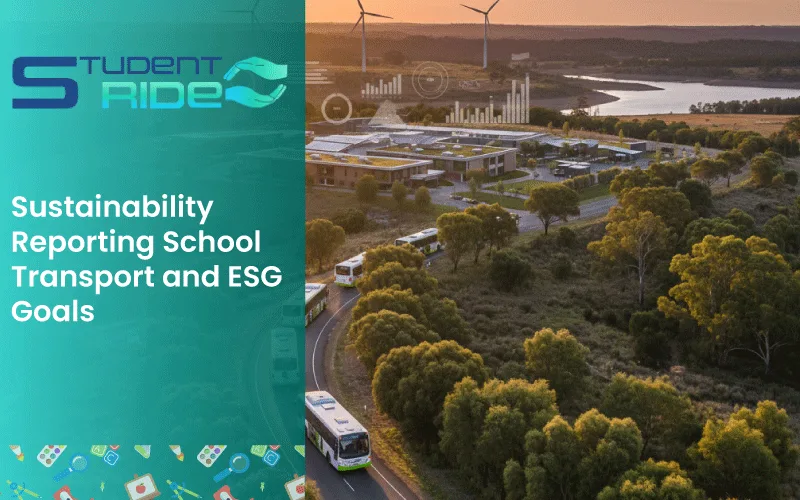Sustainability is no longer a peripheral concern for schools and councils — it’s now a key component of ESG (Environmental, Social, and Governance) accountability.
In 2026 and beyond, school transport providers play a growing role in helping educational institutions reduce emissions, improve community outcomes, and demonstrate measurable environmental impact.
At StudentRide Australia, sustainability is more than compliance — it’s a strategic framework that aligns transport efficiency with ESG reporting standards.
Why Sustainability Reporting Matters in School Transport
Across Australia, ESG reporting is becoming standard practice for both public and private schools, as well as local government bodies managing education transport contracts.
Stakeholders — from parents to policymakers — expect visibility over how transport systems contribute to sustainability outcomes.
ESG-linked reporting helps schools:
- Track and reduce carbon emissions from daily commutes.
- Demonstrate community impact and social inclusion.
- Show governance transparency through data-backed operations.
- Comply with emerging Australian Sustainability Reporting Standards (ASRS).
The transition from traditional fleet management to data-driven school transport reporting allows schools to capture key ESG metrics in real time.
Environmental (E) – Reducing Emissions and Congestion
School travel generates a significant share of local traffic emissions.
Through coordinated, technology-assisted route planning, schools can cut vehicle numbers while maintaining safety and reliability.
Environmental benefits include:
- Fewer vehicles per route, reducing total CO₂ output.
- Optimised routing that prevents unnecessary mileage.
- Consolidated journeys replacing dozens of individual car trips.
- Lower congestion around school gates during pick-up and drop-off hours.
StudentRide’s technology allows operators and schools to quantify these gains — turning operational efficiency into measurable carbon savings suitable for annual ESG reports.
Social (S) – Safety, Inclusion, and Wellbeing
ESG’s social dimension focuses on human impact. In education transport, this means delivering systems that are safe, inclusive, and equitable for all students.
Social outcomes measured through StudentRide include:
- DBS-checked, accredited drivers ensuring passenger safety.
- RFID or app-based check-ins that reassure parents.
- Inclusive access for rural, special-needs, and low-income students.
- Time savings for families — promoting work-life balance and wellbeing.
- Community support programs, including carbon-positive partnerships.
Social sustainability is about trust and fairness — ensuring that every child has access to safe, dependable, and environmentally conscious transport.

Governance (G) – Data, Compliance, and Accountability
Governance within ESG frameworks refers to oversight, risk management, and transparent decision-making.
For school transport, governance means using data systems to ensure safety compliance and ethical fleet operation.
Governance indicators include:
- Digital audit trails of all trips and driver compliance.
- Verified vehicle maintenance and inspection logs.
- GDPR- and Privacy Act-compliant data protection.
- Automated attendance and incident reporting.
StudentRide’s integrated dashboards make it possible to generate audit-ready compliance summaries — aligning transport oversight with ESG assurance frameworks.
From Data to ESG-Ready Reports
Modern ESG reporting relies on consistent, traceable data.
Through connected systems such as RFID tracking, GPS route analytics, and automated reports, schools and councils can convert transport activity into verifiable ESG evidence.
Typical metrics used in ESG reporting:
- Tonnes of CO₂ saved per academic term.
- Percentage reduction in private car use.
- Fleet efficiency rates (km per passenger).
- Hours saved for families and staff.
- Percentage of vehicles meeting Euro 6 or hybrid standards.
These measurable outcomes can then be included in annual sustainability reports, tender submissions, or school accreditation audits.
Alignment with Australian ESG and ASRS Standards
The upcoming Australian Sustainability Reporting Standards (ASRS), aligned with global IFRS S1 and S2 frameworks, will soon require organisations — including educational institutions — to disclose sustainability performance.
By adopting StudentRide’s transparent reporting tools, schools and councils can align their transport data with ASRS principles, including:
- Climate-related disclosures (Scope 1 & 2 emissions).
- Operational efficiency indicators.
- Social inclusion metrics are tied to student access and safety.
In practice, this means transport data can directly support annual ESG disclosures — moving sustainability from aspiration to quantifiable achievement.
Integrating ESG into School Transport Planning
Schools and councils can take proactive steps now to integrate sustainability reporting into their transport management systems.
Recommended actions:
- Consolidate routes to minimise fuel usage.
- Digitise attendance and journey tracking for data visibility.
- Measure fleet emissions and benchmark against prior years.
- Adopt carbon-offset programs or EV pilot fleets.
- Engage stakeholders — parents, operators, and administrators — in annual sustainability reviews.
By embedding ESG thinking in everyday operations, schools can meet government expectations while demonstrating leadership in sustainability.
The Future of ESG in Education Mobility
By 2026, ESG reporting will move from optional to expected — not only for large corporations but also for public-sector institutions and school networks.
Transport providers that can supply credible data, verified savings, and transparent compliance systems will be essential partners in this shift.
StudentRide’s role is to simplify that transition: connecting every bus, every student, and every trip to measurable sustainability outcomes.
Frequently Asked Questions
Why is ESG reporting relevant for school transport?
Because transport impacts environmental performance, social inclusion, and operational governance — three pillars of the ESG framework.
What kind of data supports sustainability reporting?
Emissions, kilometres travelled, passenger counts, safety records, and driver compliance data are all relevant ESG indicators.
Do schools need to meet formal ESG standards?
While not mandatory for all schools, ESG-aligned reporting is increasingly required for councils and education partners seeking grants or contracts.
How does StudentRide assist with sustainability tracking?
The platform provides digital dashboards for emissions, attendance, and compliance, generating ESG-ready summaries for audits or annual reports.
